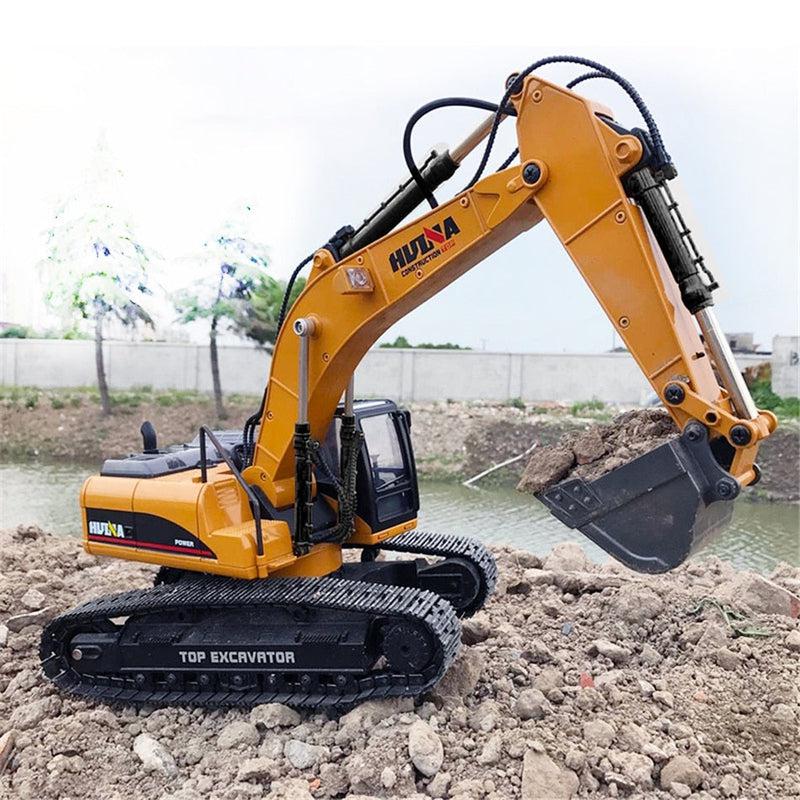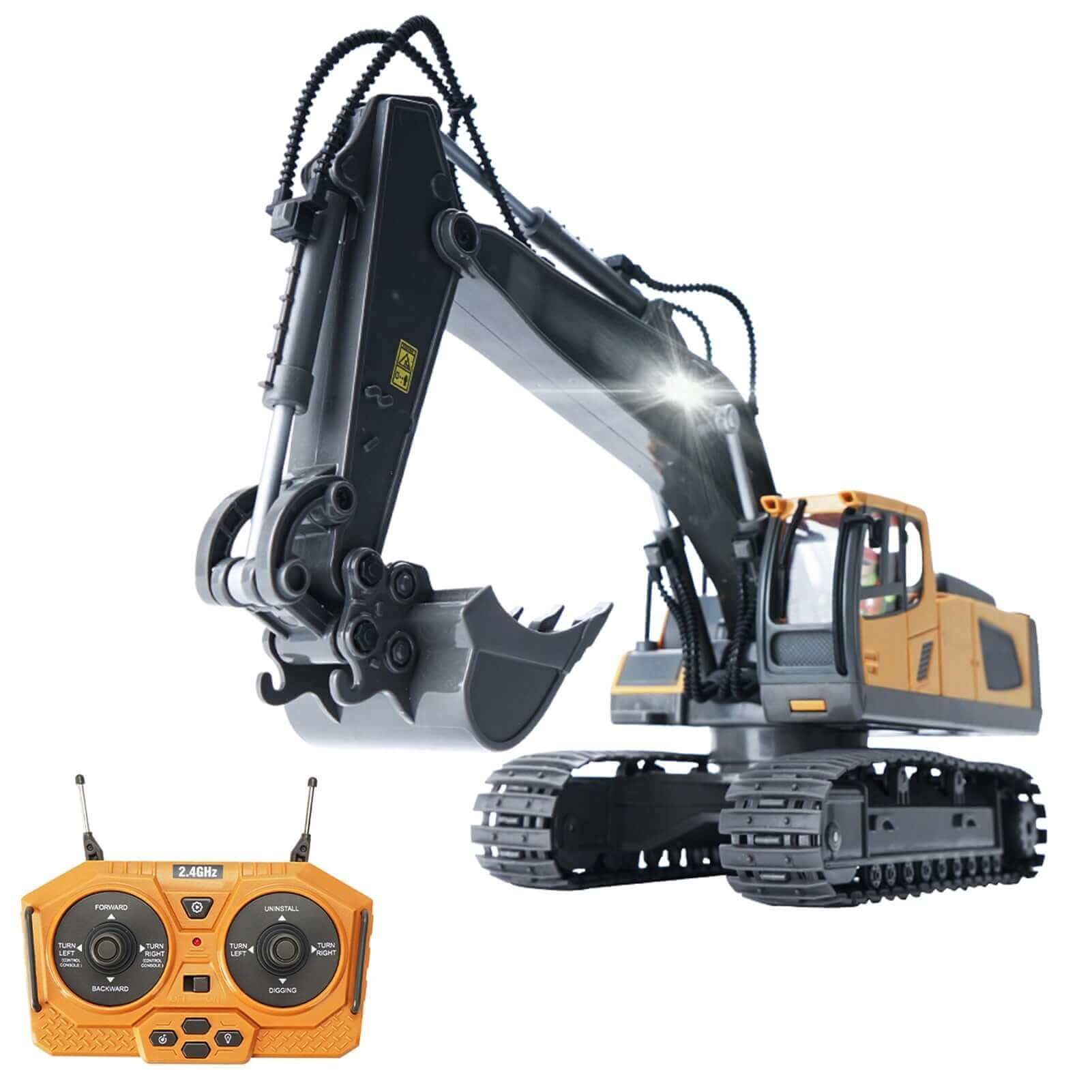Top Features of the remote control excavator That Can Enhance Your Project
Wiki Article
Recognizing Exactly How Excavator Functions and Its Influence On Performance
Excavators play a crucial duty in construction and mining operations, depending on a complex interaction of mechanical and hydraulic systems. Their capability to perform a selection of jobs depends upon both their style and the modern technology incorporated within. Comprehending these elements can significantly impact operational efficiency and efficiency. As innovations remain to improve the market, one must think about just how these adjustments will certainly affect future methods and performance.The Essentials of Excavator Mechanics

The Duty of Hydraulic Solutions in Excavators
At the heart of excavator procedure exists the hydraulic system, which plays a crucial function in powering the maker's motions and functions. This system makes use of pressurized hydraulic fluid to transfer power, enabling different actions such as lifting, excavating, and moving. By taking advantage of the principles of hydraulics, excavators can carry out tasks with remarkable precision and force, improving overall functional efficiency.The hydraulic system includes vital elements, including valves, cylinders, and pumps, which interact to control the circulation and direction of the liquid. When the driver involves the controls, the hydraulic liquid is routed to specific cylinders, converting the driver's commands right into physical movement. This device enables for receptive and smooth activities, which are important in building and construction and excavation settings. double e volvo rc excavator. The effectiveness of the hydraulic system directly affects the productivity and flexibility of the excavator, making it a crucial element in modern excavation processesTrick Components of an Excavator
Recognizing the vital components of an excavator is vital for comprehending how this powerful equipment operates. An excavator is composed of several significant components, including the undercarriage, house, arm, pail, and boom. The undercarriage gives security and mobility, usually featuring wheels or tracks to navigate numerous terrains. Your house has the engine and hydraulic systems, permitting the operator to control motion and power the machine. The boom prolongs from the home, allowing vertical reach, while the arm links to the bucket, helping with excavating and training operations.Additionally, the taxi houses the driver, geared up with controls for precise maneuvering. Each of these elements plays an important function in the excavator's overall performance, adding to its effectiveness and effectiveness on construction sites. Recognizing these components assists in preserving and optimizing excavator efficiency, making sure jobs are finished securely and effectively.Add-on Convenience and Its Advantages
Add-on convenience is a vital element of excavators, making it possible for drivers to switch over between different tools customized for certain jobs. This flexibility not only improves job effectiveness but likewise adds to cost-effectiveness by lowering the need for several machines. Understanding the different sorts of accessories readily available can significantly impact the general performance and performance of an excavator on job websites.Kinds of Attachments
While excavators are largely identified for their digging capacities, their real versatility exists in the large range of accessories readily available. These attachments improve the excavator's capability, permitting it to carry out various tasks past excavation. Common add-ons include pails (for excavating and scooping), hydraulic thumbs (for comprehending products), and augers (for drilling holes) Grapples are utilized for managing and moving particles, while rippers can separate hard surface areas. Other specialized add-ons, such as trenchers and rakes, allow excavators to adapt to certain work needs. This variety not only enhances the device's energy across different markets, including building and construction, landscape design, and demolition, yet additionally permits drivers to customize their tools to meet particular task needs efficiently.Enhanced Job Efficiency
Maximizing task effectiveness is a primary benefit of making use of numerous excavator attachments. Various attachments enable an excavator to do multiple jobs without needing to switch tools, conserving useful time and labor. For example, utilizing a hydraulic hammer can damage concrete while a container accessory can excavate dirt, enabling a seamless workflow. This versatility minimizes downtime related to devices modifications and enhances efficiency on-site. Additionally, specialized add-ons boost accuracy in jobs such as grading or landscape design, resulting in better end results. The ability to adjust to different task demands not just enhances operations yet additionally minimizes the demand for added machinery, guaranteeing that projects are finished swiftly and properly. On the whole, add-on convenience substantially contributes to raised work efficiency in excavation work.Cost-Effectiveness and Adaptability
Cost-effectiveness is a considerable benefit of utilizing functional excavator add-ons. These attachments permit a single excavator to perform numerous jobs, decreasing the requirement for additional machinery and labor - double e volvo rc excavator. By switching over between pails, hammers, and grapples, drivers can deal with various tasks, from digging to demolition, therefore taking full advantage of devices usage. This flexibility not only decreases functional prices however likewise minimizes downtime related to transforming devices. Additionally, the ability to customize excavators with specialized add-ons enhances performance, as they can successfully handle varied jobs according to task demands. In conclusion, the mix of cost-effectiveness and flexibility in excavator attachments adds to boosted functional efficiency and resource allocation in building and excavation tasks
Advanced Innovation in Modern Excavators
Modern excavators are increasingly furnished with sophisticated modern technology that transforms excavation procedures. Automation improves procedures, while improved fuel performance reduces functional costs. In addition, smart control systems boost precision and security, noting a substantial advancement in excavation devices.Automation in Excavation Processes
As excavation modern technology advances, automation has actually become a crucial element in boosting efficiency and precision on work websites. Modern excavators are geared up with advanced automated systems that promote tasks such as grading, excavating, and trenching with minimal operator treatment. These systems utilize sensors, GPS, and machine learning formulas to guarantee exact placing and deepness control, considerably reducing the margin for mistake. In addition, automation permits drivers to concentrate on tactical decision-making rather than manual controls, leading to improved productivity in general. Such advancements not just simplify operations but additionally enhance safety by lessening human mistake in complex operations. The integration of automation in excavation procedures represents a substantial improvement in building and construction innovation, driving the market towards higher efficiency and efficiency.Boosted Gas Performance
Innovations in innovation have actually also caused considerable renovations in gas efficiency for navigate to these guys modern excavators. Modern makers are geared up with sophisticated engines that enhance power output while lowering fuel consumption. These engines use innovative burning modern technologies, such as turbocharging and straight gas shot, to boost efficiency and efficiency. Furthermore, light-weight products in construction reduce overall weight, enabling much less energy expenditure throughout procedure. The intro of variable speed controls allows go to my blog operators to readjust engine efficiency according to specific jobs, additionally lessening fuel use. Consequently, these enhancements not just reduced functional costs but likewise add to environmental sustainability by lowering exhausts. Overall, enhanced gas effectiveness in excavators is a vital development that bolsters productivity and financial practicality in the building and construction market.Smart Control Equipment
While drivers browse increasingly complex job websites, wise control systems in excavators have actually become crucial devices for boosting effectiveness and precision. These innovative innovations utilize formulas and sensors to keep track of numerous parameters such as lots weight, terrain problems, and operational efficiency. By immediately readjusting hydraulic functions, wise systems maximize maker efficiency, bring about enhanced efficiency and decreased wear on elements. In addition, operators gain from instinctive interfaces that offer real-time responses and diagnostics, enabling educated decision-making. This integration of modern technology not only improves procedures but additionally decreases human mistake, contributing to much safer workplace. As the building and construction market remains to develop, wise control systems will play a crucial duty in shaping the future of excavator effectiveness and effectiveness.Enhancing Operational Efficiency With Excavators
Excavators play an essential duty in boosting operational efficiency across various building and construction and excavation tasks. Their flexibility enables multiple jobs, including material, training, and digging handling, which improves operations and minimizes the requirement for added equipment. With powerful hydraulic systems, excavators can do durable jobs with accuracy, considerably decreasing the moment needed to complete tasks. The integration of sophisticated innovation, such as general practitioner and automated controls, better optimizes their operation, allowing operators to achieve higher precision and minimize material waste. In addition, contemporary excavators are designed to take in less fuel and reduce emissions, contributing to both cost financial savings and ecological sustainability. By utilizing excavators efficiently, construction teams can improve efficiency, fulfill project target dates, and boost general site administration. This multifunctionality and efficiency make excavators crucial tools in the modern building landscape.The Future of Excavators in Construction and Mining Industries
As the construction and mining industries evolve, the future of excavators is positioned for considerable improvement driven by technological innovation and altering functional needs. Developments in automation and synthetic intelligence are reshaping excavator abilities, enabling improved accuracy and efficiency in procedures. Autonomous excavators are emerging, decreasing the need for human intervention and minimizing the danger of accidents.Moreover, the assimilation of telematics and IoT technology allows real-time tracking of device performance and predictive upkeep, maximizing uptime. Environment-friendly styles, consisting of hybrid and electrical models, are gaining traction, aligning with sustainability goals within the industry.Additionally, using innovative products and lighter designs enhances fuel efficiency while maintaining efficiency requirements. As these fads progress, excavators will play a crucial role in meeting the enhancing needs for productivity and security in building and mining, inevitably changing operational landscapes.Regularly Asked Inquiries
Just How Do Weather Influence Excavator Performance?

Weather greatly affect excavator efficiency, as rain and mud can impede traction and stability, while severe temperature levels may affect hydraulic systems. Operators should adapt to these variables to assure suitable functionality and security during operations.
What Security Steps Should Operators Follow While Utilizing Excavators?
Security measures for excavator operators include using ideal individual safety equipment, performing pre-operation inspections, guaranteeing correct communication with ground workers, preserving a risk-free range from overhanging dangers, and sticking to well-known operational procedures to stop mishaps.How Commonly Should Excavators Be Kept for Optimum Performance?
Excavators must be maintained consistently to guarantee peak efficiency, normally every 250 operating hours or as specified by the supplier. Regular checks enhance reliability, avoid unexpected break downs, and expand the life expectancy of the devices.
What Is the Ordinary Lifespan of an Excavator?
The typical lifespan of an excavator generally ranges from 10,000 to 15,000 hours of procedure. Variables affecting long life consist of maintenance practices, running conditions, and the top quality of the equipment itself, affecting overall productivity and effectiveness.
Can Excavators Operate on Unequal Surface Efficiently?
Excavators can operate properly on irregular terrain because of their verbalized Continue styles and flexible tracks. These functions enable them to maintain security and grip, making it possible for efficient procedure in difficult settings generally encountered in building and landscape design tasks. Each of these components plays an essential role in the excavator's total capability, adding to its efficiency and effectiveness on construction sites. Making best use of work effectiveness is a main advantage of utilizing different excavator accessories. While drivers browse significantly intricate job sites, smart control systems in excavators have actually arised as vital devices for boosting effectiveness and precision. Excavators play an essential duty in improving operational efficiency throughout various building and construction and excavation jobs. Advances in automation and artificial intelligence are reshaping excavator capacities, allowing for enhanced precision and effectiveness in operations.Report this wiki page